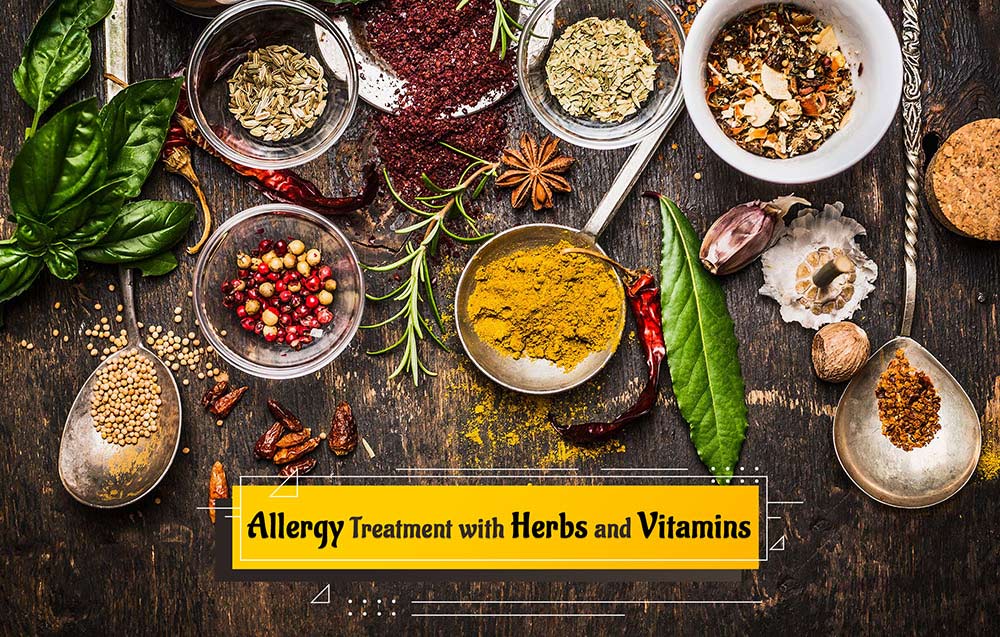Allergy Treatment with Herbs and Vitamins
Ah, springtime, when trees are budding, grasses are rising, flowers are blooming—and pollen is plentiful. For many, allergy season has arrived, invoking sniffling and sneezing. An ever-increasing number of characters are concerned: Up to 30 per cent of the population now experience seasonal allergies, according to the American College of Allergy, Asthma & Immunology.
What to do? Building a robust allergy-proof foundation begins with caring for the body by eating healthy, exercising, and handling stress, says Jonathan Psenka, N.D., author of Dr. Psenka’s Seasonal Allergy Solution (Rodale, 2015). Authorities agree that paying particular attention to the immune system is also crucial.
When allergies strike, the body exaggerates something otherwise harmless because the immune system is stressed or lacks critical nutrients. If you can balance the immune system, you can better deal with irritating allergens. This involves replenishing nutrients that the body can’t make, cannot get enough from food, or is depleted from stress and toxins exposure.
How To Treat Allergy Symptoms?
Avoiding the allergen itself is the most positive way to stop symptoms, yet this can be especially difficult if the allergen is something like dust or pollen, which you will undoubtedly encounter daily. If you visit your doctor, they will probably prescribe you an antihistamine tablet (these can also be purchased over the counter). Depending on the allergy and connected signs, they can be taken as tablets, a liquid form, a nasal spray, or eye drops.
Antihistamines act by blocking histamine, a substance released by immune system cells. Histamine attaches to the receptors in blood vessels, causing them to enlarge. Histamine also binds to other receptors, causing other signs such as redness, swelling, and itching. Antihistamines prevent these signs by blocking histamine and keeping it from binding to receptors.
While antihistamines can be effective at treating the symptoms of mild and seasonal allergies, in particular, there are several potential side effects or issues associated with taking them. They can cause you to feel drowsy and cloud your thinking, but more significantly, they do not prevent the difficulty from occurring in the first place; they mask the symptoms.
Breathe Well Essential Oil Blend
Essential Oils is a natural antihistamine and holds powerful anti-inflammatory qualities to treat and cure most maximum seasonal allergic reactions.
Our name is Breathe Fresh Essential Oil Roll-on, made with Lavender oil (acts as a common antihistamine); Ravensara and France oils ( aides to treat continuing allergic rhinitis); Eucalyptus Radiata (known as an anti-inflammatory and may help you with your press); peppermint and lemon oils produces a compelling and comforting allergy drug combination. They are mixed in Fractionated Coconut Oil.
Vitamin C with bioflavonoids
Allergens cause specific cells to create histamine, responsible for seasonal diseases like tearing, excess mucus, and a runny nose. Vitamin C stops histamine formation, while over-the-counter antihistamine pills interfere with the histamine after it is produced. Vitamin C’s immune-enhancing effect also makes it necessary to prevent infection and reduce an illness’s duration.
Rosemary
Rosemary not only tastes good on your steak but also adds rosmarinic acid, which has been shown to have anti-inflammatory and antioxidant impacts. Some small decisions have decided that it may help relieve asthmatic symptoms. One study discovered that rosmarinic acid could also suppress allergic immunoglobulin; however, more extensive research must confirm its efficacy. If you try using a rosmarinic acid addition, authorities recommend doing it with meals to withdraw an upset stomach.
Foods most fitting for allergies
- High quercetin including foods: flavonoid (antioxidant) that is anti-inflammatory, anti-allergic, antimicrobial
- Food causes of NAC (n-acetyl-l-cysteine):
- Broccoli, onions, garlic, red pepper
- Food sources for vitamin C:
- Citrus, red bell pepper, kale, strawberries, kiwi, papaya, guava broccoli, Brussel sprouts, tomatoes, peas,
- Apples, cruciferous veggies like kale, leafy greens, berries, tomatoes, peppers, cabbage, broccoli
What else can I do?
Besides supplements, people can make lifestyle changes to relieve allergy signs quickly. Pay attention to allergy triggers and work on lifestyle changes to ease allergy signs swiftly. People also benefit from salt water, which irrigates the nasal passages. Contact a healthcare provider or pharmacologist for more information about allergy medication or additions.
Honey and pollen
Raw local honey is an enjoyable, potent relief option for many people. Dosing guidance ranges from teaspoons to tablespoons per day, one dose to three or more doses.

















